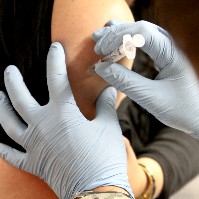A committee of experts convened by the Institute of Medicine (IOM), one of the National Academies, analyzed more than 1,000 research articles and concluded that few health problems are caused by or clearly associated with vaccines. The committee was chaired by Ellen Wright Clayton, who holds professorships in both pediatrics and law at Vanderbilt University in Nashville.
The committee’s review found convincing evidence of 14 health outcomes — including seizures, inflammation of the brain, and fainting — that can be caused by certain vaccines, although these outcomes occur rarely. These outcomes include the measles-mumps-rubella (MMR) vaccine that can lead to fever-triggered seizures in some individuals, although these effects are almost always without long-term consequences. The MMR vaccine also can produce a rare form of brain inflammation in some people with severe immune system deficiencies.
In a minority of patients, the varicella (chickenpox) vaccine can induce brain swelling, pneumonia, hepatitis, meningitis, shingles, and chickenpox in patients with compromised immune systems as well as some who apparently have competent immune function. The majority of these problems have occurred in individuals with immunodeficiencies, which increase individuals’ susceptibility to the live viruses used in MMR and varicella.
The committee found six vaccines — MMR, varicella, influenza, hepatitis B, meningococcal, and the tetanus-containing vaccines — can trigger anaphylaxis, a whole-body and potentially life-threatening allergic reaction that appears shortly after injection. And, in general, the injection of vaccines can trigger fainting and inflammation of the shoulder.
The evidence from the review shows there are no links between immunization and some serious conditions that have raised concerns, including Type 1 diabetes and autism. The data were inadequate to reach conclusions about other suggested adverse effects. They specifically noted that the MMR vaccine and diphtheria-tetanus-acellular pertussis (DTaP) do not cause Type 1 diabetes, and the MMR vaccine does not cause autism, according to the results of several studies. The evidence shows that the flu shot does not cause Bell’s palsy or exacerbate asthma.
The U.S. Department of Health and Human Services (HHS) that administers the Vaccine Injury Compensation Program asked IOM to provide a comprehensive review of study results on eight of the 12 vaccines covered by the program. They include varicella zoster vaccine used against chickenpox, influenza vaccines except for the H1N1 influenza vaccine distributed in 2009, hepatitis B vaccine, human papillomavirus vaccine, MMR vaccine, hepatitis A vaccine, meningococcal vaccines, and tetanus-containing vaccines that do not carry the whole-cell pertussis component.
* * *


 RSS - Posts
RSS - Posts
You must be logged in to post a comment.